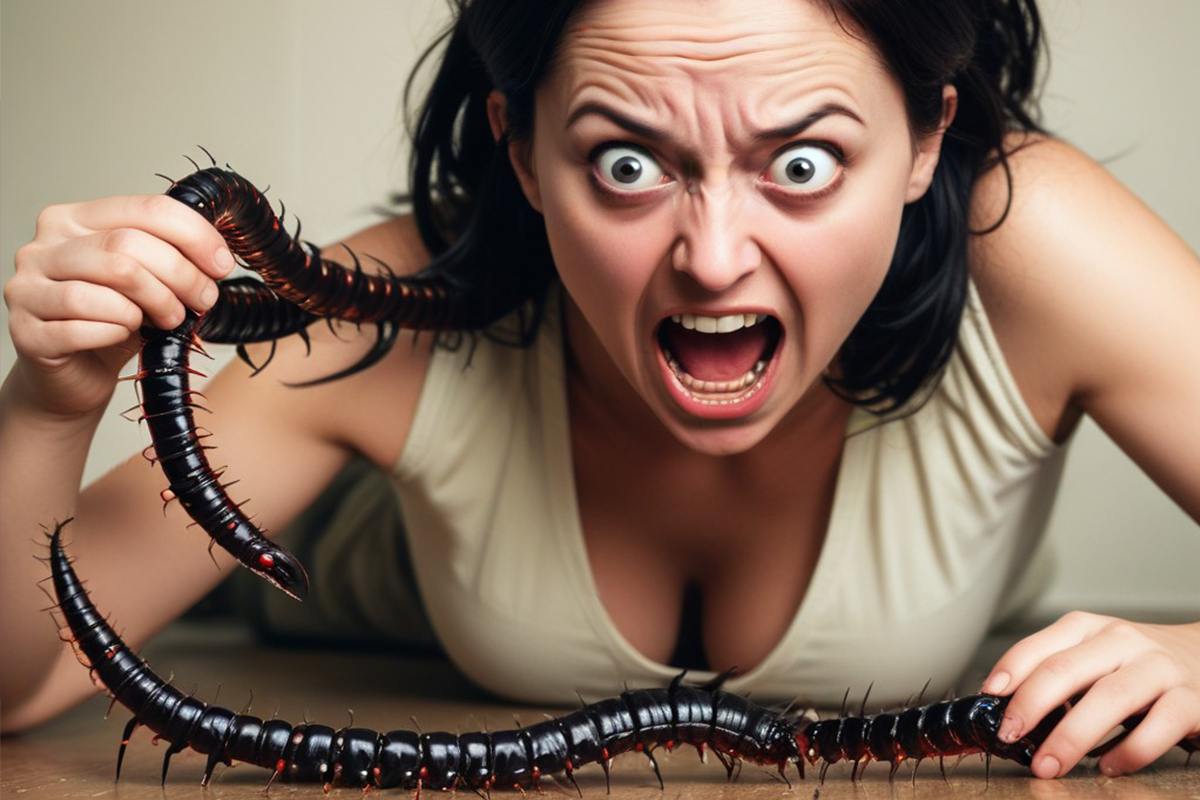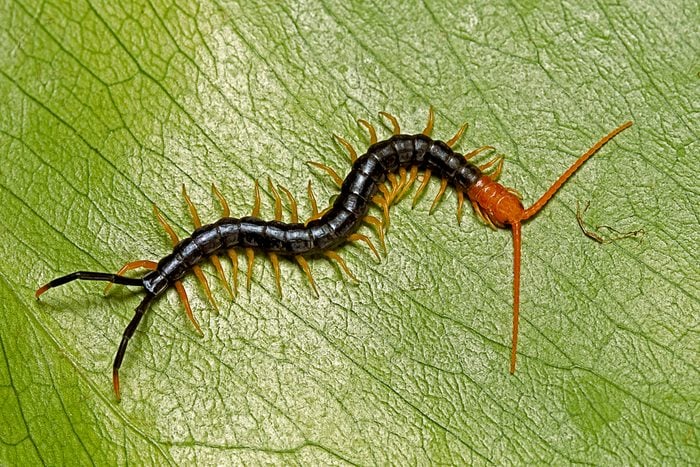Centipede Bites: What Happens If A Centipede Bites You

Centipedes are fascinating creatures that have been around for millions of years. These arthropods, which belong to the class Chilopoda, are characterized by their long, segmented bodies and numerous legs, usually ranging from 15 to 177 pairs. While most centipedes are harmless to humans, some species can deliver a painful bite when provoked or threatened.
Understanding what happens when a centipede bites you is important for several reasons. First, it can help you identify the symptoms and seek appropriate medical treatment if necessary. Second, it can help you take preventive measures to avoid future encounters with these creatures. Lastly, it can dispel common misconceptions and myths surrounding centipede bites, which can lead to unnecessary fear or panic.
In this article, we will explore the symptoms and effects of centipede bites, as well as the treatment and prevention options available. By the end, you will have a better understanding of how to handle centipede bites and protect yourself against potential attacks.
Centipede Bites: Symptoms and Effects
When a centipede bites, it injects venom through its modified front legs, which are called forcipules. The severity of the symptoms depends on several factors, such as the size and species of the centipede, the location and depth of the bite, and the individual's sensitivity to the venom.
What do centipede bites look like?

Common symptoms of centipede bites include:
Pain and swelling: The bite area may become red, swollen, and painful, similar to a bee sting or a spider bite. The pain may range from mild to severe, and it may last for several hours or days.
Redness and itching: The bite area may also become itchy and red, which can be relieved with over-the-counter creams or lotions.
Allergic reactions: In some cases, the bite may trigger an allergic reaction, which can cause symptoms such as hives, rash, difficulty breathing, or anaphylaxis. If you experience any of these symptoms, seek medical attention immediately.
Rare cases of necrosis: In rare cases, the venom of some centipede species may cause tissue damage or necrosis, which can lead to scarring or disfigurement. However, this is not common and usually occurs in people with compromised immune systems or underlying health conditions.
It is important to note that most centipede bites are not life-threatening, and they can be treated at home with basic first aid measures.

Additionally, if you are unsure about the species of the centipede or the severity of the bite, it is always better to seek medical advice.
Centipede Bites: Treatment and Prevention
If you or someone else has been bitten by a centipede, here are some steps you can take to alleviate the symptoms and prevent further harm:
Clean the wound: Wash the bite area with soap and water to prevent infection. Apply a sterile bandage or dressing to the wound.
Apply a cold pack: Apply a cold pack or a cloth filled with ice to the bite area to reduce swelling and pain.
Take over-the-counter pain relievers: Over-the-counter pain relievers, such as acetaminophen or ibuprofen, can help reduce pain and inflammation.
Monitor the symptoms: Keep an eye on the symptoms and seek medical attention if they worsen or if you experience any allergic reactions.
For medical treatment, a healthcare professional may recommend:
Antihistamines: Antihistamines can help relieve allergic reactions and reduce itching.
Antivenin: In severe cases, a healthcare professional may administer antivenin to neutralize the venom and prevent further damage.
Tetanus shot: If the wound is deep or dirty, a healthcare professional may recommend a tetanus shot to prevent tetanus infection.
To prevent centipede bites, here are some tips:
Wear protective clothing: When going outdoors, wear long pants, socks, and closed-toe shoes to protect your skin from centipedes.
Avoid damp and dark areas: Centipedes prefer damp and dark areas, such as basements, crawl spaces, and leaf litter. Avoid these areas if possible.
Use insect repellent: Insect repellent can help deter centipedes and other pests.
Keep your home clean: Regularly clean your home, especially areas where centipedes may hide, such as under sinks, in closets, and in basements.
Seal entry points: Seal any cracks or crevices in your home's exterior to prevent centipedes from entering.
Facts About Centipedes Bites
Centipedes are carnivorous and venomous, using their venom to sting and eat prey like insects and worms. They are not typically aggressive towards humans but may bite if provoked.
Centipede bites can be identified by two puncture marks where they inject venom into the skin, causing pain and swelling. Larger centipedes may deliver more venom, resulting in intense pain.
Symptoms of centipede bites include pain, redness, swelling, itching, and allergic reactions. Severe symptoms like fever, chills, and difficulty breathing may occur in rare cases.
Centipedes do not have teeth but use their forelegs, filled with venom, to scratch and inject venom into the skin. Bites may result in blistering and varying levels of pain.
Centipede bites can usually be treated at home by washing the area, applying ice, and taking over-the-counter medications. Severe allergic reactions may require medical attention.
Centipede venom contains chemicals like serotonin, histamine, and cardio-depressant toxin-S, which can lead to serious allergic reactions and neurological effects in some individuals.
While centipede bites are painful, they rarely cause severe health complications in people. Symptoms typically resolve within a few hours to days without long-term effects.
Centipedes bite to defend themselves or capture prey, and bites may become infected if not properly cleaned and treated. Larger centipedes can cause more pain, especially in sensitive individuals.
Frequently Asked Questions (FAQ'S)
Q. What is a centipede?
A centipede is an arthropod with a segmented body and numerous legs. They are predators that feed on insects, spiders, and other small animals.
Q. Are all centipedes venomous?
Not all centipedes are venomous, but the ones that are can deliver a painful bite. The severity of the venom varies among species.
Q. What are the symptoms of a centipede bite?
Symptoms of a centipede bite include pain, swelling, redness, itching, and allergic reactions. In rare cases, the venom may cause necrosis.
Q. How do I treat a centipede bite?
Treat a centipede bite by cleaning the wound, applying a cold pack, taking over-the-counter pain relievers, and monitoring the symptoms. Seek medical attention if necessary.
Q. How can I prevent centipede bites?
Prevent centipede bites by wearing protective clothing, avoiding damp and dark areas, using insect repellent, keeping your home clean, and sealing entry points.
Q. What should I do if I see a centipede in my home?
If you see a centipede in your home, you can safely remove it with a container and a piece of paper. Alternatively, you can contact a pest control professional.
Q. Can centipedes climb walls?
Yes, some species of centipedes can climb walls and ceilings. They use their legs to grip onto surfaces and move quickly.
Q. How long do centipedes live?
Centipedes can live for several years, depending on the species. Some species can live for up to 6 years.
Q. Do centipedes bite humans in their sleep?
Centipedes are not known to bite humans in their sleep. They are not aggressive towards humans and prefer to avoid contact.
Q. Can centipedes be kept as pets?
Yes, some species of centipedes can be kept as pets. However, they require special care and handling, and they may pose a risk to humans if not handled properly.
Conclusion
In conclusion, centipede bites can be painful and potentially dangerous, but they are not a common occurrence. By understanding the symptoms, effects, treatment, and prevention options, you can minimize the risk of centipede bites and their impact.
Remember, most centipede bites are not life-threatening, and they can be treated at home with basic first aid measures. However, if you experience severe symptoms, such as difficulty breathing, chest pain, or fainting, seek medical attention immediately.
Additionally, by following prevention tips, such as wearing protective clothing, avoiding damp and dark areas, and sealing entry points, you can reduce the likelihood of centipede bites and their effects.
